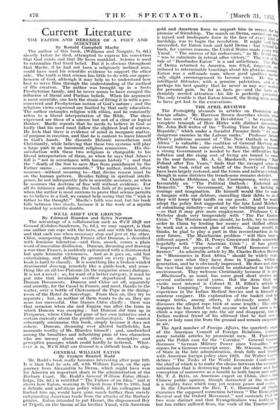Current Literature
THE FAITHS AND HERESIES OF A POET AND SCIENTIST By Ronald Campbell Macfle
The author of this book, (Williams and Norgate, 7s. 6d.) shortly before he died, attempted to express his conviction that God exists and that He loves mankind. Science is used to rationalize that fixed belief. But it is obvious throughout that Macfie, if he had not been a religiously inclined man, could have used his scientific evidence to support the other side. The truth is that science has little to do with our appre- hension of God, although it may help us to understand how best to serve Him through the understanding of the method of His creation. The author was brought up in a Scots Presbyterian family, and he never seems to have escaped the influence of literal and Puritan beliefs. When his argument is most scientific, one feels the strain of fitting it in with a pre- conceived and Presbyterian notion of God's nature • and the religious views expressed are limited by that early education. The author entangles religion with ethics, and he constantly refers to a literal interpretation of the Bible. The ideas expressed are those of a sincere but not of a clear or logical thinker. Macfle repeats that he needs to believe in God so badly that his need must follow the slightest lead of science. He feels that there is evidence of mind in inorganic matter, of purpose in creation, and that he is content to leave himself in God's hands. He discards Hebraic monotheism and Christianity, while believing that these two systems will play a large part in an imminent religious renascence. His dis- satisfaction with these two religions is chargeable to his literal interpretation of them, as when he says that Adam's fall is " not in accordance with human history " • and that the " death of the Son to save Man from punishment by the Father seems . . . unreasonable." The author, indeed, often assumes—without meaning to—that divine reason must be on the human pattern. Besides failing' in spiritual intelli- gence, he not infrequently fails in scientific accuracy, as when he assumes the doctrine of free will without evidence. For all its intimacy and charm, the book fails of its purpose ; for . when the author is most anxious to prove that science permits us to believe in a God, we cannot help seeing that the " wish is father to the thought." Macfie's faith was real, but his book falls between two stools, because it is the work of a mystic troubled by scientific doubts.








































 Previous page
Previous page